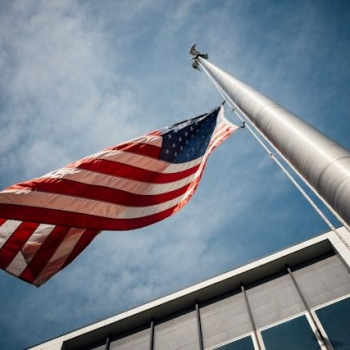Is all discrimination invidious? Or is it okay for a religious organization to require its members to subscribe to certain religious beliefs, including religious beliefs that are viewed as discriminatory?
That's apples and oranges. That's not what this case was about. What you're talking about was a university policy that would not permit, for example, Catholics to have only male priests in their worship services. This was not about worship services. This was not about observance. This was about whether or not a student group was going to get the state's imprimatur. They can't have the state's imprimatur if they engage in defined, limited categories of discrimination. So, just as they are not permitted to discriminate on the basis of race, or gender, they cannot discriminate on the basis of sexual orientation.
It really comes down to the judgment that if the government decides that there will be no discrimination along certain categories, the groups that get the benefits from the government are going to have to abide by those rules.
Yet the Christian Legal Society will respond that they were not discriminating on the basis of sexual orientation, but on the basis of religious belief.
The Supreme Court rejected that argument on solid authority. That theory was firmly rejected by a majority of the Supreme Court. That makes it the law.
Now, I understand that Michael McConnell often defines the law in ways that are not consistent with the Supreme Court, but the Supreme Court justices do make the law, and what they said is that it is constitutional and neutral for the government to have this kind of a policy.
Who right now should be celebrating? Who benefits from this ruling? What's the creative potential of this ruling to do something good for our society?
The Supreme Court said that government can enforce an anti-discrimination rule. Every woman, every minority, homosexuals, everyone who is discriminated against, has a reason to celebrate. So that's a good chunk of our society.
The truth of the matter is that every time a case comes down and a group loses, they portray it as the end of liberty for everybody. That is a false portrayal. We should all understand that that perspective is skewed and often misleading, and it's not good for our society. I am very serious about talking about liberty here, and I will not accept that somehow liberty is being suppressed just because religious groups cannot get money from a university. That is a real distortion.
Marci Hamilton holds the Paul R. Verkull Chair in Public Law at the Cardozo School of Law, Yeshiva University. An expert in Constitutional Law and especially the First Amendment, Hamilton has also taught at the Emory School of Law, the NYU School of Law, and Princeton University, and was a fellow at the Center for Theological Inquiry. Having clerked for Sandra Day O'Connor, Hamilton has presented oral arguments before the United States Supreme Court, four of the federal circuit courts, and two state supreme courts. In 2001, she received a lifetime achievement award for her pro bono services to veterans groups.
Hamilton has authored numerous works, including God vs. the Gavel: Religion and the Rule of Law.





